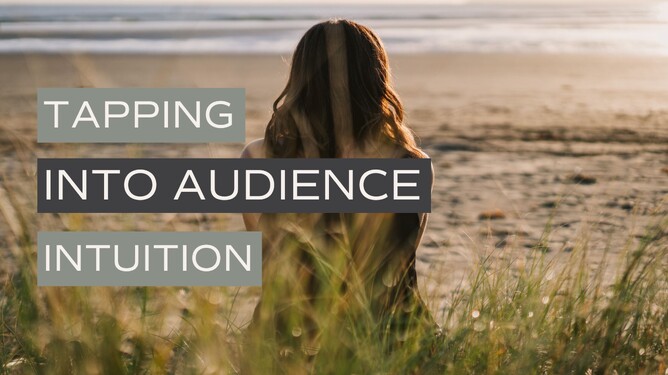Gut feeling. Intuition. A hunch. Vibes. How often have you made a decision based on something feeling either ‘right’ or ‘off’ and hindsight has proved that feeling in your belly was spot on? Some might be inclined to call it woo-woo, but this is less about consulting tarot cards and more about recognising that not every decision we make is based purely on logic.
We often use the science of selling psychology to back up what we do as copywriters. Science has its place, sure. But there is something else beyond logic that is driving our customers’ decision making. And it’s not just emotion, it’s knowing.
In his article, The Noetic Future of Culture and Brands author Zach Lamb talks about this new way of knowing: noetics. “Noetics is defined as inner wisdom, direct knowing, intuition or implicit understanding”.
Noetics, derived from the Greek word noesis, refers to the study of consciousness, the mind, and intuition. It explores the potential of human thought and the impact of emotions and beliefs on reality.
So yeah: vibes, basically.
Let’s be honest, there are shifts happening for so many humans. We’re watching the world burn around us and as such we’re in search of greater authenticity, meaning and significance in the decisions we make. We're feeling closer to our own sense of truth, pushing aside expectations, owning our innate gifts and curating the right community ‘energy’ around us.
Intuition is, of course, a familiar concept. It’s just that now, it’s recognised more and more as a valid decision-driver in modern culture. We’ve had religion. We’ve had science. And now we have noetics against a post-truth backdrop. We’re turning inwards; we’re trusting ourselves because we have less trust in the societal or institutional structures we’re witnessing around us.
(Maybe, also, we’re all in search of a little more wonder in an often weary world?)
So, when we land on a website in search of a service provider, a product, a consultant… we’re not just relying on what our brain processes, but what our intuition recognises as a safe place to be.
Move over emotion, intuition is the new copy hero.
Emotional targeting through messaging is nothing new. But it’s also missing a trick for our noetically-inclined audience. Emotional targeting relies on self image and social image. Self image is how someone thinks they will feel about themselves when they buy a product or service (confident, educated, prettier). Social image is how someone thinks others will see them.
Emotional drivers come from the heart and the head. In copywriting, we leverage emotion to help customers predict how they’ll feel and act in the future.
But again, we know trust has taken a hit. We are savvy to sneaky conversion techniques, long-winded sales pages that convince us we’re lacking, and dark UI patterns. We’ve wised-up to messaging that is ultimately trying to talk us into projection bias (where we overestimate how much our future selves will share the same beliefs, values and behaviours as our current selves). Then, there’s AI, which is redefining our own sense of 'intelligence'.
So, while selling with emotional benefits looks like: “If you buy our product or use our service, you’ll feel this way about yourself”, selling with noetics is more like: “You are validated. You’re right to feel this way. Your sensibility was right.”
The thing about noetics is that it is a form of knowledge that is entirely subjective. It’s hard to describe or share how it is that you know what you know. ‘The vibes were off’ may be true to you, but can’t exactly be proven objectively. But, still, noetic brands validate these feelings.
So, noetics in copywriting?
By understanding and integrating principles of noetics into your messaging strategy, you can create content that resonates more deeply and meaningfully with your audience to inspire ‘gut feeling’ action.
We want to take a stronger stand with our brand (so, what are we telling people about who we are, what we believe and how we operate?). When people land on our website or open our email, do they immediately feel a part of something that feels good to them?
Here’s what to consider:
Tap into emotional intelligence: Understand the emotional needs and desires of your target audience (through voice of customer research. I can help you with that). Pay close attention to customer feedback and use it to understand their emotional drivers. Use language that speaks to these emotions through the use of storytelling techniques.
Focus on the positive: Use affirmative and empowering language in your copy. Positive words and phrases can create a sense of optimism and trust, encouraging customers to feel good about engaging with your brand.
Have a deeper POV: Express your real thoughts. The ones that may make you an outlier. Don’t be afraid to take a stand and be clear about the kind of people you want to work with / have within your business community.
Stay unapologetic: Be FULLY yourself. Be genuine in your own messaging, your own voice and your own branding. This isn’t about sales spin (or what you think people want to hear). Talk about your own drivers and beliefs (not just values) and lived experiences that brought you to where you are today. Share the things that matter to you. Demonstrate that you offer a space of vulnerability. Authenticity builds trust and credibility. 'Your' people will find you and they'll know you're the one for them.
Offer a vision: Help your audience visualise the positive outcomes of using your product or service. Paint a picture of the benefits and the emotional rewards they will experience. Use descriptive language that appeals to the senses. This not only makes your copy more vivid and engaging but also helps to evoke emotional responses.
Is this just fluff dressed up as marketing speak?
My approach to copywriting is to come with a toolkit. In my bag I have the science stuff, the emotional psychology stuff and also, this noetic stuff. Cold hard facts still matter if we want people to believe what we’re saying and we still need to have a means to measure our marketing. We’re not taking a step back and ditching science. But facts and figures alone aren’t going to make someone think: this is the service provider for me. I believe there’s a place for all of it. It starts by knowing your audience, like, really knowing your audience. That happens through research.
It’s no surprise to me that as intuitive decision making is increasing in influence, more of my clients are asking for Voice of Customer research - which gives them greater insight into the true motivations behind their clients’ behaviour. If you’re curious about how your brand could leverage VoC insights into noetic messaging, reach out for a chat.

